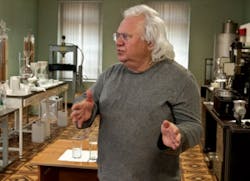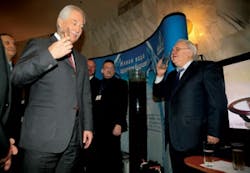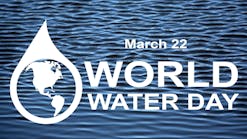With over 10 million Russians lacking access to quality drinking water and almost 30% of pipelines in need of desperate replacement, serious efforts are needed to bring infrastructure up to scratch. Eugene Vorotnikov looks at the progress of project 'Chistaya Voda' and the efforts of scientist Viktor Petrick and his nanotechnology water filters.
The fate of an unprecedented project in the Russian water industry called Chistaya Voda (Clean Water) remains questionable due to an ongoing struggle between its supporters and opponents, as well as huge state funds required for its implementation. Nevertheless, its possible suspension will not solve a major problem: the need for a full-scale reform of the Russian water industry.
According to the Russian regulatory bodies, between 35% to 60% of total reserves of drinking water in Russia currently do not meet sanitary standards, with 40% of surface and 17% of underground spring water considered as impotable.
Nor does it help that the level of pollution in Russian rivers and lakes from agricultural and industrial waste exceeds all the minimum standards. Nearly 11 million people in Russia do not have access to quality drinking water, while around 50 million people, (approx. a third of the country's population), drink water with high iron levels.
The current status of the Russian water supply system leaves much to be desired. According to local experts, almost 30% of all the Russian water pipes need to be replaced in the near future, however only 1.5% of them are replaced each year.
Payback period of an average project that involves the reconstruction of water pipes is eight years. If the project starts from scratch, this period increases up to 12 years, which is too long for the Russian economy as businesses reluctantly invest money in long-term programs.
However, even if the volume of repair works was to be increased several times, this would still not be sufficient to solve the problem of delivering clean water to consumers. At present, the Russian water-economic complex requires constant budget investments to at least keep it in its present condition and to prevent further deterioration. According to analysts' estimates, most of the Russian water pipes should be changed during the next two or three years due to their emergency condition.
At the same time, according certain analysts from United Russia, the only way out of this situation is to apply modern technologies to boost water supply. One such project is titled "Clean Water", a controversial project initiated by Russia's ruling party, "United Russia".
Clean Water
Clean Water was officially launched in 2006 by "United Russia" through an initiative spearheaded by Boris Gryzlov, member of the party and head of the Russian State Duma. At the initial stage, the total cost of the project, (which was scheduled for completion by 2025), was estimated at 15 trillion rubles (USD $576 billion). Nevertheless, a few months ago, it was revised up to 150 billion rubles with an annual investment of 10 billion rubles.
The new project is multifaceted and involves the upgrade of water supply and sewage systems in Russia, changes in legislation to help protect water resources, stimulating the production of equipment and the establishment of the Russian brand of drinking water, which will be able to compete with world-renowned brands.
(Left) Testing the waters: If fully approved Petrick's filters could be installed in public and social institutions across Russia
Gryzlov said that the project is based on three basic principles: to promote the consumption of quality drinking water in the country, to continue scientific research on water treatment, as well as the development of special technical regulations, regarding the required quality of water.
Ruslan Kondratov, a member of United Russia and one of the initiators of the project, said: "Our main goal is to provide the Russian population with quality drinking water for a reasonable cost. This will be achieved by starting the installation of a new technology for water filtration at people's homes and apartments throughout the country. Russian businesses understand that their investments in this program will pay off very quickly."
According to authors of the project, the deterioration rate of water-supply systems in some regions of the country reaches 80%, while the government has no time and money for their reconstruction. In this context, it will be more reasonable and economically worthwhile to start using modern systems for water purification instead of launching any expensive repair works.
Such a solution has been recently proposed by a group of Russian scientists led by Viktor Petrick, a well-known Russian academic and scientist, who was able to develop a unique water filter, based on carbon mixture of high reactivity (HRCM) and nanotechnologies. The latter, according to Petrick, means the new filters lack competition in the modern world. The new filters will be the first product based on nanotechnologies launched for commercial production in Russia. According to the project, Petrick's filters could be established in all government institutions, as well as homes, schools and hospitals.
"Our traditional household filters are not designed for water purification from radioactive contamination, as some scientists claim," says Petrick. "Such a function would be redundant for them. The purification of water from radioactive contamination is a completely different technology, where our carbon mixture is just one link in the chain of complex solutions."
If everything goes as planned, Petrick's filters will be installed in all public and social institutions throughout Russia, which would require changes in the Russian federal and regional legislation. It is expected that through using the filters, a new Russian flagship drinking water brand could be created, which will be able to compete with such world-renowned brands as Aqua Minerale and Coke's Bonaqua.
Opponents
Meanwhile the Russian academic community has strongly criticised the new project and its author. A special Pseudoscience Commission of the Russian Academy of Sciences has recently published its report regarding with Petrick's discoveries.
According to its verdict, Petrick's invention can be considered as a business solution, but not a scientific development. The Commission also criticised some past inventions of Petrick, indicating that they can not be implemented into practice, due to the fact that the inventor has incorrectly interpreted physical laws.
Edward Kruglyakov, member of RAS, deputy director of the Institute of Nuclear Physics RAS, says: "If Petrick's filters were created on the basis of nanotechnology, they may pose a risk to human health, due to their possible ability to produce nano [dust], which can be dangerous for human health."
In the meantime the position of Russian-based scientists has been supported by their Russian scientists working abroad, who have called on Russia's President Dmitry Medvedev and Yuri Osipov, President of the Academy of Sciences, about the need to introduce a scientific expertise as a mandatory condition to adopt such major expensive projects as Clean Water.
"We are confident that the lack of such expertise in making decisions about the implementation of major national projects and strategic state programs, such as Clean Water is unacceptable and could eventually lead to a catastrophe," they said.
According to them, the government should not spend billions on such projects and instead of this should start the replacement of corroded pipes with their plastic analogues, which are much cheaper and which have a longer life expectancy compared to metal pipes.
Oleg Shein, deputy chairman of "Fair Russia", another Russian party, says in order to solve the problem of water in Russia there is a need to allocate funds for the development and renovation of water-supply system and to overturn a law, which allows the privatization of water supply systems, which was the same United Russia.
Meanwhile, amid fierce debate about the future development of the Russian water industry, the local government is still unable to take a final decision about the way of the reform.
According to Russian media reports, the government has still some doubts about the prospects of "Clean Water". The project was not included in the list of 37 state programs in 2011-2013, presented by Ministry of Economic Development, due to the Russia's Ministry of Finance inability to provide funds for the project in the near future. However, everything might change in the coming months.
The future of Clean Water looks very bright, due to the fact the government is still unable to undertake a massive reform in the domestic water industry. There is a possibility that the entire reform may be limited to cosmetic repair of the most worn-out pipes throughout the country and the replacement of corroded pipelines.
However, if everything goes wrong for Clean Water, "United Russia" is still going to provide the population with clean water. In this regard, the party plan to establish a special commission in the Russian State Duma, which will be responsible for the development of alternative projects in the Russian water industry.
More Water & WasteWater International Current Issue Articles
More Water & WasteWater International Archives Issue Articles




